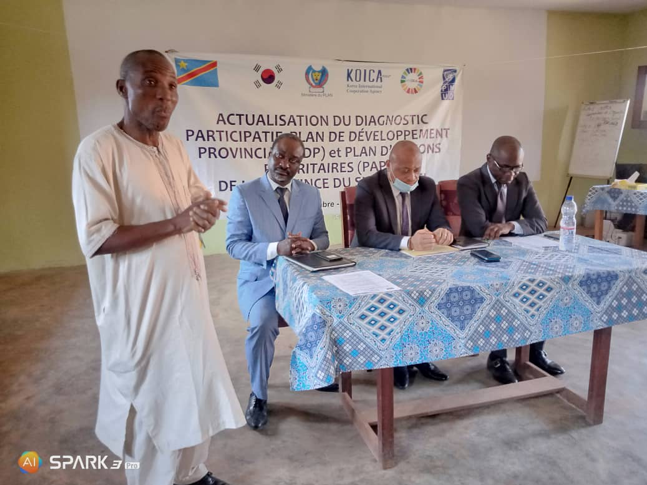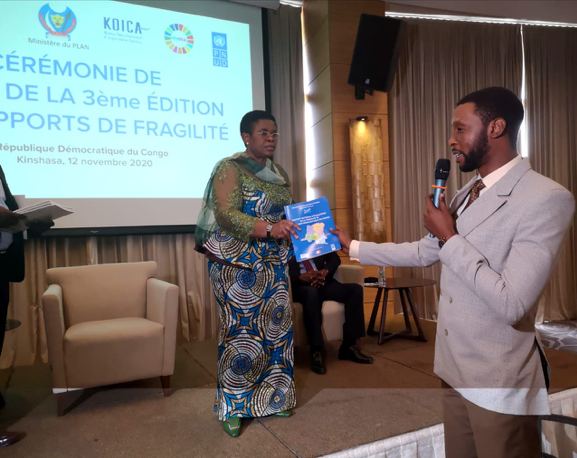Since 2011, the Democratic Republic of Congo (DRC) has been a strong supporter of the Busan Partnership for Effective Development Co-operation. Fast forward to 2021 and the DRC leads as the Co-Chair for the Global Partnership for Effective Development Co-operation – a multi-stakeholder platform dedicated to achieving more effective partnerships. In parallel to the agreement of the Busan Partnership, the ‘New Deal for engagement in fragile states’ is an agreement between fragile states, development partners and civil society organizations that is defined by five Peacebuilding and Statebuilding Goals (PSGs)[1] and two principles of ‘focus’[2] and ‘trust’[3] that are the foundation for achieving the Sustainable Development Goals (SDGs).
Since 2013, UNDP has been engaged with the DRC government in the implementation of the New Deal process, specifically focusing on national and provincial planning as a tool for the country's transition out of fragility.
The Democratic Republic of Congo, known as the second largest country in Africa, is composed of 26 provinces and more than 100 million inhabitants with nearly 50% of the population living below the poverty line, only 30% have access to drinking water and 10% (35% in urban areas) to electricity. It is in the face of these immense structural challenges that the UNDP, thanks to funding from the Korea International Co-operation Agency (KOICA), is currently supporting at scale the DRC's Ministry of Planning and other sectoral ministries to plan at national, provincial and sectoral levels for inclusive, country-led transitions out of fragility by helping implement the five tools within New Deal’s principle of ‘focus’.

According to the New Deal, fragility assessments are seen as a fundamental diagnostic step to enable the country to define a vision in their planning process in a participatory manner.
Unlike the first two fragility assessments conducted in the DRC in 2013 and 2016 at the national level, the 2018 assessment was conducted in 18 provinces to accurately reflect the reality in the provinces to guide the vision, policies and resources for the achievement of the SDGs by 2030.
DRC’s 2018 Fragility Assessment highlighted three main lessons: the country is in a crisis phase of the fragility spectrum, the level of fragility at the national level is similar to that of the provinces except in areas of justice, where progress has been made in Kinshasa thanks in part to newly created judicial institutions, and the recent updated fragility matrices have broadened the country's technical circle with more effective participation of the National Institute of Statistics.

Next, the process of defining ‘one vision, one plan’ is a crucial step that should be country-owned and led, developed in consultation with multiple stakeholders including government, academia, civil society, and the private sector. Through several consultations and contributions from a wide array of local actors, the results of the fragility assessment guided and informed the DRC's 2019-2023 National Strategic Development Plan (NDP), with support from the Ministry of Planning and UNDP.
In addition to national planning, in almost 12 provinces, UNDP and the Ministry of Planning are working together to identify the needs of each province and develop a plan adapted to the realities of the provinces: Provincial Development Plan (PDP). Furthermore, through sharing of knowledge between peer countries of g7+, organized in Sierra Leone in 2018 with support from UNDP, the DRC also plans to develop sectoral plans in the four areas of culture and the arts, human rights, youth and transport.

It is the compact or mutual accountability framework (MAF) that facilitates the government and its partners to implement such plans mentioned above. Lessons learned from Sierra Leone and Somalia showed that dialogue and financing mechanisms are two key components necessary for effective implementation. To this end, GPEDC Co-Chair Ministry of Planning is currently preparing to organize a multi-actor Action Dialogue to accelerate the implementation of the national and provincial plans. UNDP is also currently supporting a diagnostic assessment of DRC’s development finance by conducting a Development Finance Assessment (DFA) based on which a financing mechanism using the Integrated National Financing Framework (INFF) tool will be developed.

In 2021, an all-accessible Platform for Aid and Investment Management dashboard was developed which compiles data on all development co-operation disbursed by sector as well as the financing status of the vision and strategic pillars defined in the National Development Strategy Plan (PNSD), in the 5 PSGs of the New Deal and the 17 Sustainable Development Goals (SDGs). UNDP supported the Ministry of Planning in the capacity building of experts in charge of this Aid Information Management System. Funded by the KOICA, this digital platform systematically manages the development finance for the national and provincial development plans by facilitating data collection, monitoring funding, and ensuring the effectiveness and transparency of development aid.

Noting the importance of political dialogue for the success of the above, DRC will be hosting a Global Partnership Action Dialogue, organized in line with the exercise of DFA. The DFA process will assess the entire structural and institutional ecosystem governing the process of mobilizing resources for development financing in the DRC in an attempt to identify opportunities for mobilizing more financial resources to achieve the goals set out in the SDP for the SDGs. The Action Dialogue will focus in on the quality and effective use of these resources. As such, this timely, multi-stakeholder dialogue will help launch DRC's Integrated National Financing Framework to ensure the effectiveness of collective efforts for sustainable development.
The Democratic Republic of Congo, with its vast natural resources, diverse population, and great potential for development in the heart of Africa, is on track to plan and implement their own vision for achieving decisive, sustainable transformations in the living conditions of its population and its economy through effective, multi-stakeholder partnerships.


[1] PSG refers to the following guidelines: Legitimate Politics, Security, Justice, Economic Foundations, Revenues & Services
[2] FOCUS principles on country-led pathways out of fragility refers to the following elements/tools: Fragility Assessment, One Plan One Vision, Compact, Use PSGs to Monitor, Support Political Dialogue and Leadership
[3] TRUST principles on commitment for results refers to the following elements/tools: Transparency, Risk Sharing, Use and Strengthen country Systems, Strengthen Capacities, Timely and Predictable Aid
Cover photo credits: PNUD RDC/Aude Rossignol
